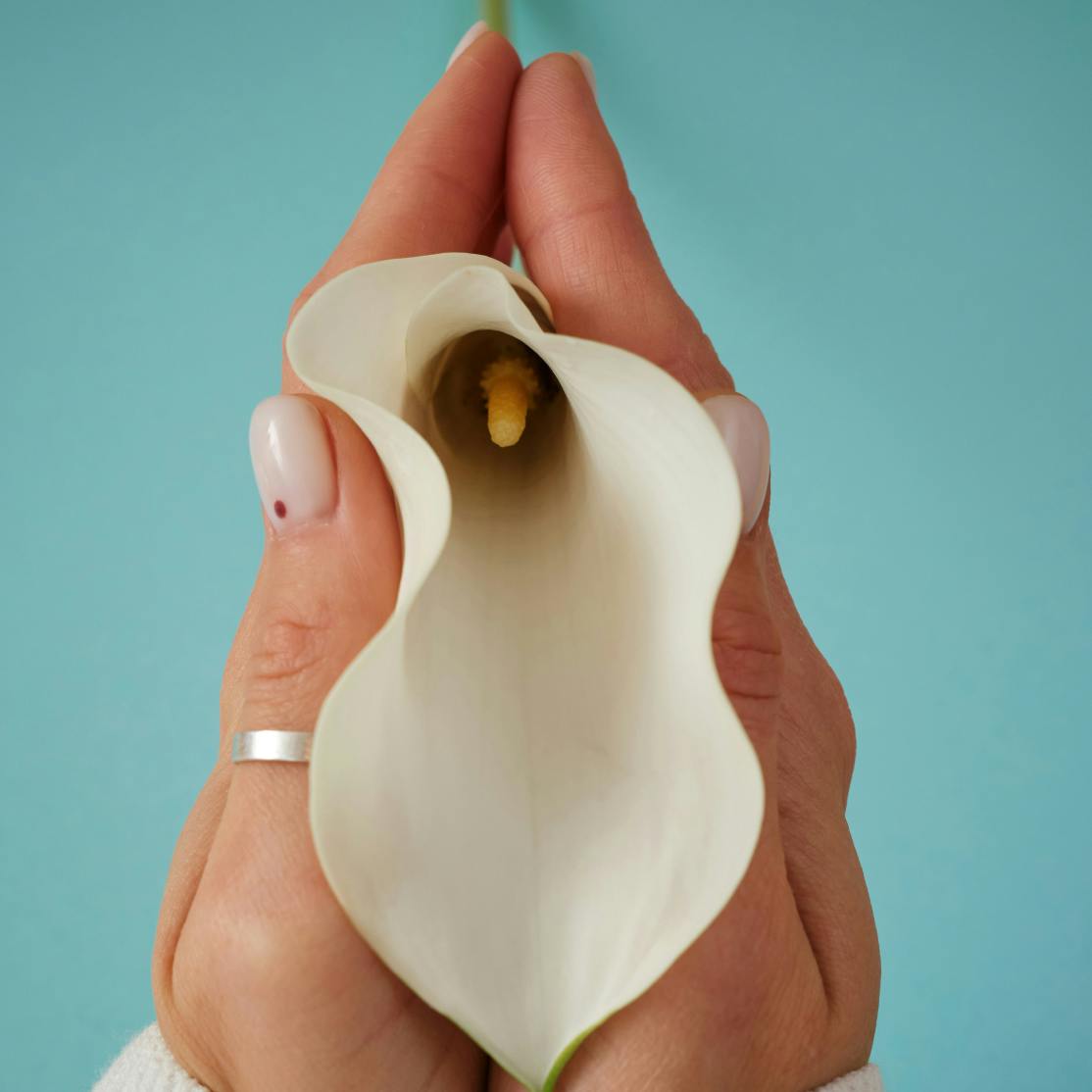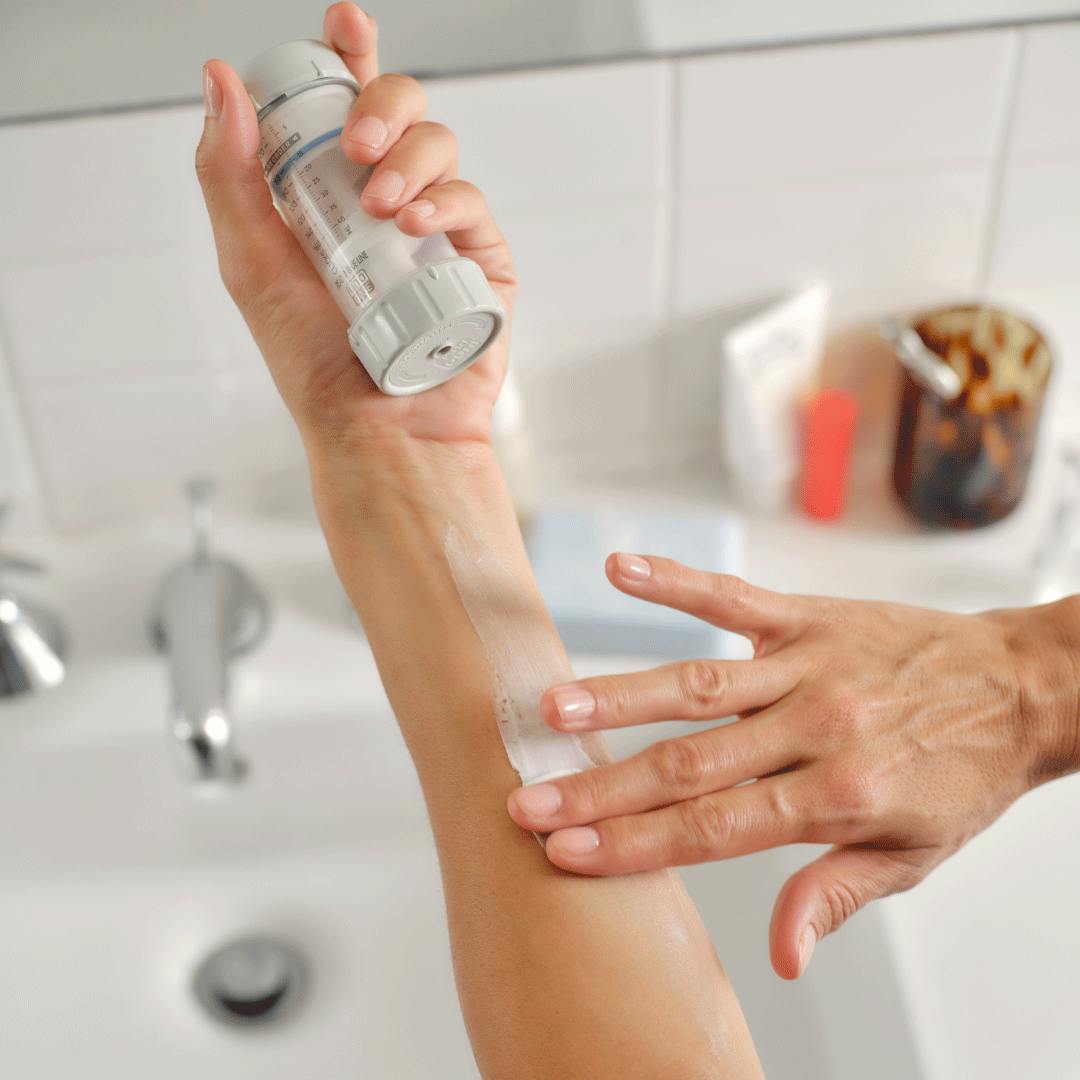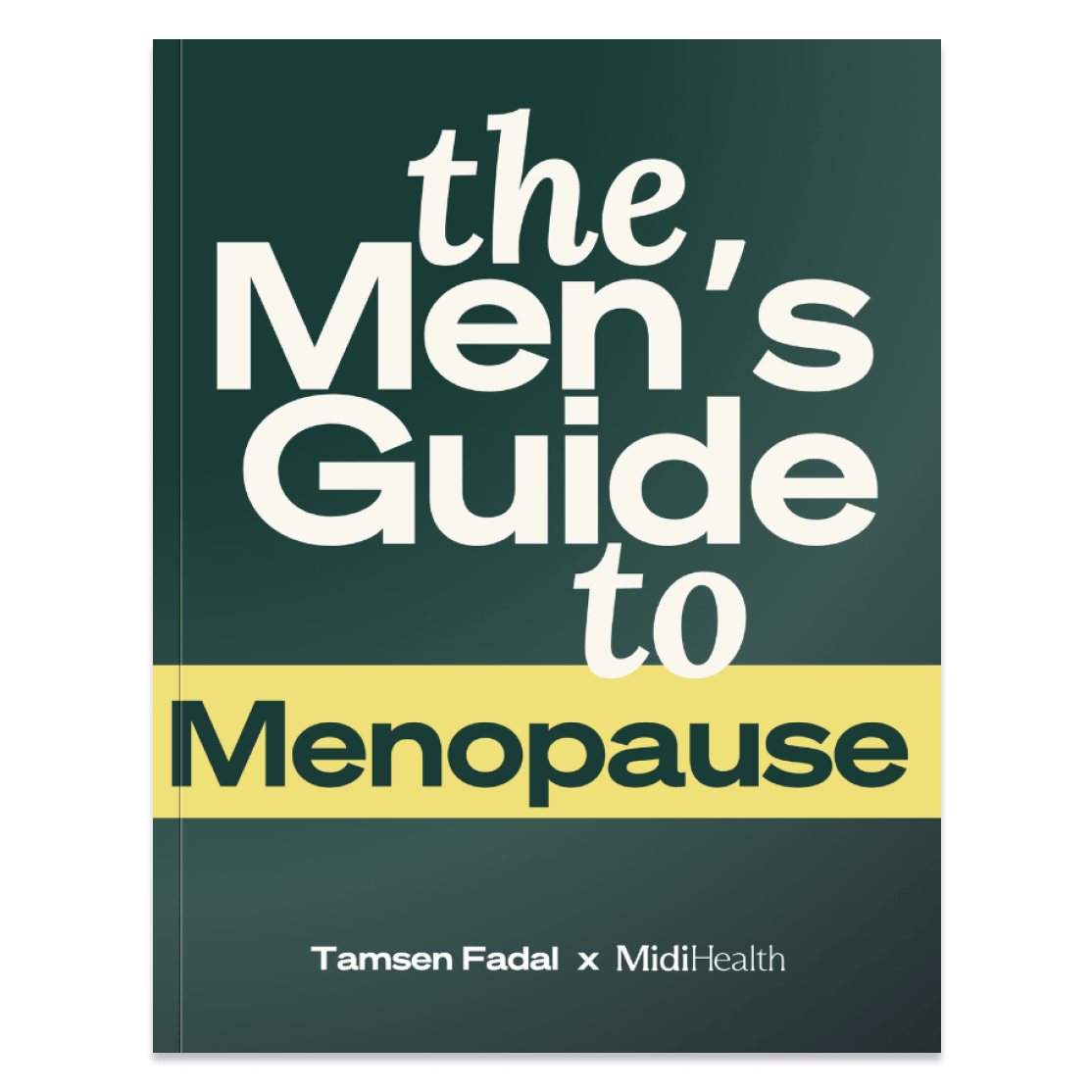Most women experience changes to their labia minora (the inner folds of the vulva) during menopause. And yet they rarely talk about their symptoms—vaginal dryness, painful sex, itching—with a healthcare professional. At Midi, our clinicians have heard it all, and they can help you find solutions for whatever you're experiencing, including how to handle changes to your labia minora.
Hot flashes. Brain fog. Mood swings. You were prepared to tackle menopause symptoms like these. (OK, maybe not prepared, but at least you were aware of them.) They come with the territory of earning your age. What you probably never expected were the vaginal changes.
We’re specifically talking about your labia minora (the inner folds of your vulva), which can become paler, thinner, smaller, and more delicate during perimenopause and menopause. You might also experience dryness and sensitivity that can make sex and even peeing feel like a million little daggers. If you're thinking, Wait, what?!, you're not alone.
“Most women don't know that changes to the genitourinary (GU) system, including your labia minora, are incredibly common as you transition from perimenopause to menopause,” says Midi Health clinician Sonya Carothers, PhD, MSN. In fact, research shows that 50% to 70% of all women in midlife will experience some degree of GU issues.
And they’re rarely talked about. Women may not discuss their symptoms with their healthcare professional, believing they just have to suck it up and deal with them or feeling too embarrassed to bring them up. Even many doctors fail to address the subject with their patients. So let’s talk about the issues you may be experiencing and get you the answers—and relief—you deserve.
What Happens to the Labia Minora During Menopause?
Menopause can cause your labia minora to thin out; shrink; appear less pink than usual; or become more dry, itchy, fragile, and sensitive.
In an observational study published in Climacteric that looked at specific symptoms among menopausal women, 90% reported reduced lubrication; 82% experienced painful sex; 75% said their vaginal tissues looked paler; 63% had labial itching, burning, or irritation; 69% noticed decreased elasticity; and 37% said their labia minora had shrunk or disappeared. The medical term for this cluster of issues is genitourinary syndrome of menopause (GSM).
“Many of the other symptoms that come with menopause—the hot flashes, mood swings, brain fog, night sweats—will go away in time. But the changes that happen to the GU system will progressively worsen unless they're treated. However, they can be treated,” says Dr. Carothers.
Why Do Vaginal and Vulvar Changes Occur During Menopause?
You have receptors for the sex hormone estrogen throughout your body. A high concentration of these receptors is found in the vaginal area. During your reproductive years, estrogen targets and binds to them, helping regulate a number of important physiological processes. For example, it keeps your vaginal tissues robust, elastic, and moisturized.
But as you approach and go through menopause, estrogen levels naturally dip. Eventually, they drop so low that you stop ovulating and having periods.
This hormonal shift can cause significant changes to your GU system. With little to no estrogen hitting those receptors, you may experience menopausal vulvar and vaginal issues, ranging from a loss of your natural lubrication and plumpness to a thinning and atrophy of your labia minora.
Common Vaginal Changes During and After Menopause
These changes tend to be gradual, starting in your perimenopausal years and becoming more severe as you go through menopause.
Here are some of the symptoms you could notice:
- vulvar and vaginal dryness
- tissue atrophy
- loss of elasticity and fullness
- increased itching, burning, irritation, and sensitivity
- shortening and tightening of the vagina
- thinning labial tissue that’s prone to tearing
- changes in coloration (namely paleness) of the labia minora
- urinary frequency, urgency, or incontinence
- increased risk of infections, such as yeast infections and bacterial vaginosis (BV)
- painful sex from lack of moisture and tissue atrophy and sensitivity
- bleeding after sex
- reduced sexual sensation, making it harder to orgasm
Vaginal Atrophy
Yes, it’s a surprising-but-true fact: Your vulva and vagina can actually shrink—in size, shape, and volume—during menopause. (If you’re Googling around, you might see the term “vaginal atrophy.” But the more accepted term that doctors—including Midi clinicians—use is GSM.)
Why does this happen? It’s primarily due the steep decline in estrogen, which may cause the area down there to become drier. Estrogen also affects collagen levels in the skin, making your vaginal tissues less plump and elastic. You might notice that your labia is smaller than you remember it being, too. Some women find that it vanishes almost completely.
As a result of these changes, sex might become painful.
“The vaginal canal shortens and narrows, the tissue thins out, and the lubrication is gone. Something similar happens with your labia—the dryness, thinness, and fragility. That’s why intercourse hurts so bad,” says Dr. Carothers. “And actually, that outer labial area is probably the most troublesome with sex. The burning and pain can prevent even getting to the inside of the vagina.”
GSM can up your odds of yeast infections and BV, as well. That’s because the drop in estrogen and other hormonal shifts—along with tissue changes—alter your vaginal microbiome. (Yep, you have one there, too, not just in your gut.) The beneficial bacteria that keep yeast and other bad bugs at bay can get crowded out by the harmful kind, which multiply and then…ouch.
Emotional and Psychological Impact of Vulvar and Vaginal Changes
If you notice dryness, discomfort, or anything else that doesn’t feel or look right, speak up. Don’t just accept that, well, gee, this is how my body must be now. It doesn’t have to be. And not addressing your symptoms with your healthcare professional can take a real toll on your well-being.
“Emotionally, a lot of women feel unattractive, like they’re not enough anymore. And there’s a lot of avoidance around sex, because it’s so painful,” says Dr. Carothers. “There’s a mind-body mismatch. Their brain may be saying, ‘I’m ready. Bring it on.’ But their body says, ‘Oh, hold up. No.’ And it can have a profound impact on relationships. I had one couple who was in the middle of a divorce because the wife didn’t want to have sex anymore. Her husband thought she had lost interest in him, but really, she had just lost interest in sex in general due to the changes she was experiencing—and the taboo around talking about them. It can get that bad.”
Dr. Carothers adds that she often starts to have a conversation about GSM with her female patients during their perimenopausal years, so they know what to expect down the line. Open communication is key to normalizing all of these shifts and getting the support you need. If your healthcare professional doesn’t bring it up, then don’t hesitate to raise the issue yourself.
And talk with your partner about it as well. It can be a huge relief for both of you. And then the two of you can find ways to reclaim your intimacy.
True Stories Of Transformation
How to Manage and Care for Vaginal and Vulvar Changes
Menopause is a life stage; it’s not a prison sentence. No matter what degree of vaginal and vulvar changes you might have, many treatments can ease any symptoms that are bothering you. Here goes:
- Moisturizers: Moisturizers, which include brands such as Revaree and Replens, work slightly differently than lubes. “They are put into the vagina or onto your vulva every 1 to 3 days and adhere to the tissue, meaning that they can offer continuous moisture,” says Dr. Carothers. “It’s similar to applying body moisturizer to the other skin on your body. It keeps the area moist and plump and can be extremely helpful. Often I recommend both lubricants and moisturizers to patients who are sexually active.”
- Lubricants: Think: products like Astroglide or Sliquid. These over-the-counter (OTC) products can be used on the vulva, vagina, and penis to add temporary moisture and reduce the painful effects of friction.
- Vaginal estrogen: This is a prescription medication that helps restore your vagina and vulva back to their perimenopausal state—plumper, moister, less sensitive. Vaginal estrogen also helps with urinary frequency and incontinence and reduces the odds of yeast infections and BV. It comes in various forms, including creams, tablets, and vaginal rings. “And because vaginal estrogen works at the point of application—and isn’t absorbed into your bloodstream—it can be used in conjunction with hormone replacement therapy (HRT) and OTC treatments like lubricants,” says Dr. Carothers. “It’s even safe for women with a history of breast cancer.”
- Hormone Replacement Therapy (HRT): HRT is commonly prescribed to help relieve vaginal and vulvar dryness, as well as other symptoms of menopause, such as hot flashes, night sweats, brain fog, mood changes, and recurrent vaginal and urinary tract infections. It can be very effective, so it’s worth having a conversation with your healthcare professional to see if you could be a good candidate for this medication.
- Vaginal laser therapy: This nonsurgical in-office procedure uses a laser to make tiny lesions to your vagina or vulva. (Despite how it sounds, it’s typically painless.) The result is an increase in blood flow and collagen and elastin production that helps restore moisture and tissue thickness.
When to Consult a Healthcare Professional
Any symptoms that bother you or affect the quality of your life warrant a call to your doctor—full stop. Maybe you’re concerned about changes to the way your genital area looks or feels after menopause; or sex has become painful; or you have dryness, burning, itching, or frequent infections. Perhaps you’ve tried lubes and moisturizers and still haven’t gotten the relief you need. Or you want to explore vaginal estrogen or HRT.
Remember that you have options, and don’t put it off. You can work with your clinician to find a treatment that will ease whatever symptoms you’re having.
Proactive Tips for Maintaining Vaginal Health During Menopause
In addition to OTC and prescription treatments, you can try several lifestyle changes to alleviate GSM, such as:
- Use gentle, fragrance-free skin care products: When you hop in the shower or bath, avoid any harsh products that can irritate your skin and dry it out more. There are products specifically available for vulvar health.
- Do pelvic floor exercises: Yup, we’re talking Kegels. This simple move promotes blood flow and tissue health.
- Stay hydrated: The human body is mostly water, so it makes sense that sipping plenty of H2O keeps your tissues moist and healthy.
- Have fun: OK, this might seem totally counterintuitive (and a total no-go!) if menopause is making intercourse—or any kind of vaginal stimulation—painful for you. But you can explore new sexual practices to enhance your pleasure and bypass anything painful. Talk with your healthcare professional about lubricants that can help and other ways to ease back into it.
Maintaining a Healthy Sex Life
If you wonder whether you can keep the intimacy and pleasure in your relationship going once you hit midlife, the answer experts will give you is: Heck yeah.
Dr. Carothers says it starts with good communication—with your partner and your healthcare professional. Talk with your doctor about your symptoms and concerns about how menopause may be affecting your sex life.
Estrogen therapy (like HRT and vaginal estrogen) are prescription options that can help improve vaginal tissue health and make intercourse the enjoyable experience it should be. “Often women begin to feel like sex is a chore that they have to endure through the pain. Treatments like these can bring the pleasure back,” says Dr. Carothers. Lubes and vaginal moisturizers can help, as well.
It’s also important to share your symptoms and desires with your partner. Then the two of you can find ways to make sex better for both of you. For example, you could try different positions or play around with different lubes and vaginal moisturizers. Having an open dialogue can also deepen your partner’s understanding of what you’re going through—and reassure them that any issues you have with sex have nothing personal to do with them. They’re just a medical fact of menopause that can be addressed so you can reclaim the intimacy in your relationship.
Key Takeaways
- Changes to the genitourinary (GU) system, including the labia minora (the inner folds of the vulva), are incredibly common during the transition from perimenopause to menopause.
- The labia minora can become paler, thinner, smaller, and more delicate during perimenopause and menopause.
- This can lead to dryness and sensitivity that can make sex and even peeing painful.
- To address painful side effects that accompany labia minora changes, solutions like moisturizers, lubricants, vaginal estrogen, hormone replacement therapy (HRT) may be recommended
Frequently Asked Questions (FAQs)
Does your labia minora disappear at menopause?
It’s not uncommon for your labia minora to get smaller during menopause—to the point where it may not be visible. It is a normal process that can happen as estrogen levels drop during midlife, causing a thinning and reduction of your vaginal tissue.
What does a menopausal labia look like?
Menopause can make your labia appear paler. It may also look smaller and less plump. Not all women have noticeable changes like these—but if you do, know that it’s absolutely normal, as it’s one of the many consequences of estrogen levels dropping off in midlife. Still, it’s always worth discussing any issues like these with your doctor.
Why is my labia minora hanging out?
Menopausal changes affect vulvar tissue in different ways. For some women, lack of estrogen and another hormone called DHEA (dehydroepiandrosterone) cause a loss of elasticity in the muscles and connective tissue that can make your labia minora look like it’s drooping (for lack of a better term) below the outer lips of your vulva. This is totally normal.
Does menopause change your labia?
Yes, it can. Between 50% to 70% of women in midlife experience symptoms like reduced lubrication, sensitivity, itching and burning, painful sex, and a labia minora that appears paler and smaller. You may have some or all of these changes to one degree or another. That’s why it’s important to speak with your clinician to get the appropriate treatment for your specific symptoms.
If you’re in perimenopause or menopause and want guidance from clinicians who specialize in women’s midlife health, book a virtual visit with Midi today.
Hormonal change is at the root of dozens of symptoms women experience in the years before and after their period stops.
Our trained menopause specialists can help you connect the dots to guide you towards safe, effective solutions.
Whether you need personalized guidance or a prescription routine to tackle symptoms—including vaginal dryness and irritation, brain fog, hot flashes, sleep trouble, mood swings, and weight gain—we’ve got you covered.
Midi’s mission is to revolutionize healthcare for women at midlife, wherever they live and whatever their health story. We believe that starts with education, to help all of us understand our always-changing bodies and health needs. Our core values guide everything we do, including standards that ensure the quality and trustworthiness of our content and editorial processes. We’re committed to providing information that is up-to-date, accurate, and relies on evidence-based research and peer-reviewed journals. For more details on our editorial process, see here.







